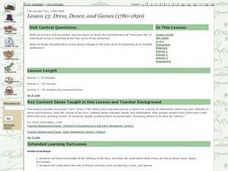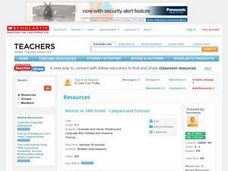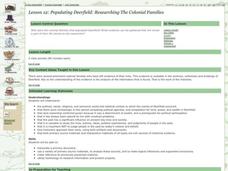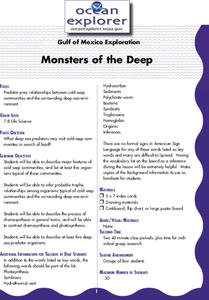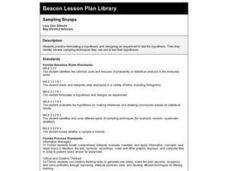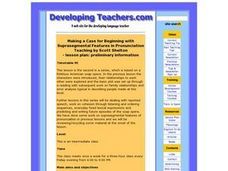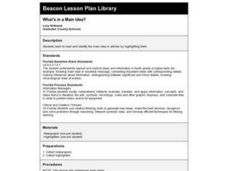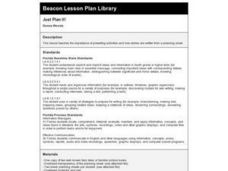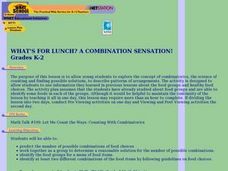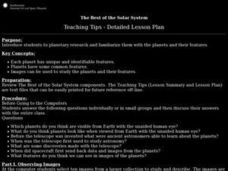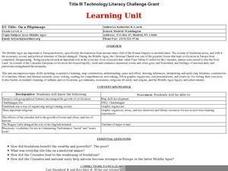Curated OER
We Arrived 10,000 Years Ago...
Students explain ways that humans migrated from Asia and settle in the Americas. In this investigative lesson students participate in a brief archaeological demonstration and review what they learned.
Curated OER
New england (1780-1820): Dress, Dance and Games
Students examine and discuss nineteenth century clothing and compare it to contemporary styles. After writing paragraphs describing the clothing styles, they play games from the period. For homework, they create their own games to play...
Curated OER
The Poet's Message-"The Colored Soldier" by Langston Hughes
Students analyze the poem, "The Colored Soldier" by Langston Hughes to gain a greater experience of how poets use language to create meaning, influence thinking and thus become pioneers of change in American society. They work on the...
Curated OER
Miracle on 34th Street
Students compare the movie Miracle on 34th Street to the book. In this holiday lesson plan, students read the book and view the 1995 version of the movie, Miracle on 34th Street. Students use a Venn diagram to analyze the similarities...
Curated OER
Harriet Tubman: Dancing on the Freedom Trail
Young scholars observe a dance interpretation about Harriet Tubman. In this art/social studies lesson, students explore how their emotions can be expressed through movement and create their own dance or dramatic interpretation.
Curated OER
The Story of How Deerfield Came to Be
Eleventh graders explore how the native peoples had lived in the Connecticut Valley for nearly 10,000 years, prior to the English settlement and how their culture and life ways were markedly different from that of the English settlers.
Curated OER
Populating Deerfield: A Workday for Researching the Colonial families
Eleventh graders explore who were the colonial families that populated Deerfield and what evidence can be gathered that reveals a part of their life stories to the researcher.
Curated OER
Victorian Philosophies in the Connecticut River Valley: The Connection between Mind, Body, and Spirit
Eleventh graders explore late 19th century concepts of physical and spiritual health, which includes spiritualist and conservation movements, heath tonics, the perceived relationship between climate and physical well being.
Curated OER
Monsters of the Deep
Students describe major features of cold seep communities, and list at least five organisms typical of these communities. They infer probable trophic relationships among organisms typical of cold-seep communities.
Curated OER
Ancient Cultures
Students develop archeological skills in order to explain how scientists determine what ancient cultures were like. They develop an appreciation of the work that is involved in finding out about our past.
Curated OER
Sampling Snoops
Learners practice formulating a hypothesis and designing an experiment to test the hypothesis. They identify several sampling techniques they can use to test their hypotheses.
Curated OER
The Best of the Solar System (Grades 4-7)
Learners explore planetary research and become familiar with the planets and their characteristics. They compare and contrasts planets and moons.
Curated OER
Making a Case for Beginning Wigh Suprasegmental Features in Pronunciation
Students explore the ways in which voice quality and intonation can convey meaning.
Curated OER
Using Authentic Literary Text With Advanced Learners
Students practice reading for the gist of a text, improving reading speed, and fostering interest in reading authentic texts. They explore the use of figurative language.
Curated OER
What's in a Main Idea?
Second graders read newspaper articles. In this language arts lesson, 2nd graders identify the main ideas found in the articles by highlighting them. The entire class selects one interesting article from the sports section to discuss.
Curated OER
Just Plan It!
Fourth graders practice using a planning sheet for a well-known fairy tale or picture book.
Curated OER
What's For Lunch? A Combination Sensation!
Students combine different foods to make possible lunches and determine the specific combinations of lunches that can be made from a finite set of foods.
Curated OER
The Best of the Solar System (Grades 6-8)
Students are introduced to planetary research and become familiar with the planets and their features. They view images of the planets, and fill in an information chart which is imbedded in this plan.
Curated OER
On a Pilgrimage
Sixth graders engage in a variety of learning experiences surrounding the study of the Middle Ages. They construct a map of Europe, create a graphic organizer for the hierarchy of feudalism, design their own family crest, and write their...
Curated OER
Martian Sun Times
Learners become weather reporters for the Martian Sun Times newspaper to gather. interpret, and compare current weather information for Mas and Earth. Final articles be posted on-line. There are seven investigations in this unit.
Curated OER
Understanding Canadian Weather Extremes
Students research and analyze the causes and sources of Canada's extreme weather conditions. They conduct an experiment, complete a worksheet and predict the most likely locations for extreme weather conditions.
Curated OER
Fossil Fuels vs. Alternative Fueling Systems
Fourth graders brainstorm the differences between the fossil fuels that people use in their transportation now and what they could use to minimize greenhouse gas emissions. They use a variety of techniques from webquests to writing...
Curated OER
Rhetorical Devices
Eleventh graders consider rhetorical devices in speeches and then make an informed selection of effective rhetorical devices for a controversial topic presentation. Students present their findings using presentation software.
Curated OER
Take Only Photos and Leave Only Bubbles
Students make careful observations and record their observations. They communicate their findings with their peers and analyze data collected about a site. They determine what it means to be a looter, and feel the direct effects of...
Other popular searches
- Teaching Inference Skills
- Teaching Inference Reading
- Teaching Inference Implicit
- Teaching Inference 2nd
- Teaching Inference +Reading



